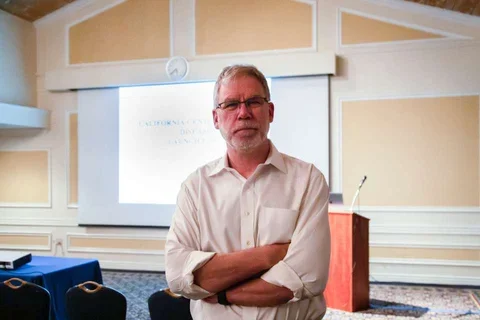Identifying rare genetic diseases and helping to reinvent modern medicine

Stanley Nelson, MD named the Dr. Allen and Charlotte Ginsburg Endowed Chair in Translational Genomics
When Stanley Nelson, MD, M. Carrie Miceli, PhD(Link is external) and Melissa Spencer, PhD established the Center for Duchenne Muscular Dystrophy at UCLA in 2006, no treatments existed for the rare genetic disorder that affects about 1 in 5,000 boys — including Nelson’s now 21-year-old son, Dylan Miceli-Nelson.
At the time, Dr. Nelson redirected his own laboratory to focus on translational genomics to improve diagnosis and support work on Duchenne muscular dystrophy and other genetic diseases. Now, thanks in part to that work and the efforts of industry partners in translational genomics, there are four approved treatments for DMD. Still, these treatments can help only about 25% of children with the condition. There’s no specific therapy yet approved for the other 75%, Dr. Nelson says.
Translational genomics focuses on translating the findings of genetic research into practical applications, including diagnostics and therapies, for genetic diseases.
“There is a steadily evolving process of translational genomics of how we’ll treat a genetic disease,” Dr. Nelson says. “And the field is working out the steps and the crank that we can turn potentially over and over again for all sorts of other muscle diseases, or nerve diseases, or liver diseases, or heart disease, or lung disease.
“Collectively, we are in the process of reinventing what medicine looks like by working to solve rare genetic diseases,” he says. “So we’re in a very steep learning curve right now.”
Dr. Nelson recently was named the inaugural Dr. Allen and Charlotte Ginsburg Endowed Chair in Translational Genomics, part of a $29 million gift to establish the Ginsburg Center for Precision Genomic Medicine, to support his work in this area.
The gift “is an important indicator of the opportunities and importance of tackling rare diseases and I am so pleased that it will make this work a tangible part of what we’ll be doing on the UCLA campus indefinitely,” Dr. Nelson says.
Allen Ginsburg, MD, a retired ophthalmologist who completed his residency at UCLA in 1963, has been interested in genomic research since the human genome was first sequenced in 2003.
“It has great promise,” Dr. Ginsburg says. “It also has some things that need to be worked on.”
The promise of translational genomics
Over the past decade, more than 1,000 different disease genes have been identified through the worldwide genetic network, Dr. Nelson says. His lab at UCLA has helped identify 60 new disease genes over that period.
“By identifying how specific genetic mutations cause a specific disease, we not only learn about human development and biology in unprecedented ways, but we also immediately impact patient diagnostics and can return findings back to people that would otherwise be unsolved for their lifetime,” Dr. Nelson says, adding that genetic findings can inform treatment insights for many diseases.
Translational genomics led to ideas that enabled development of approved treatments for Duchenne muscular dystrophy and spinal muscular atrophy, another genetic disorder that affects children...
Want to learn more about Dr. Stanley Nelson's research in translational genomics and how comprehensive evaluations can help extremely rare genetic diseases?
Visit the UCLA Health article on Dr. Nelson's research.